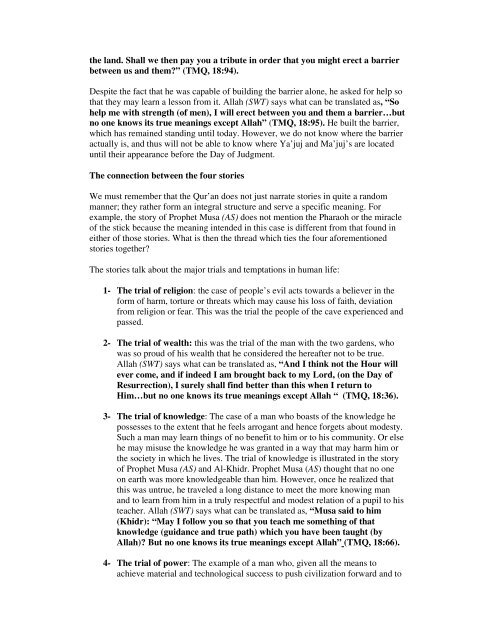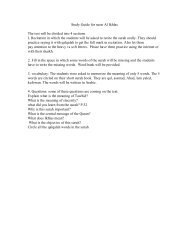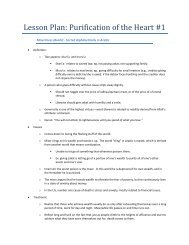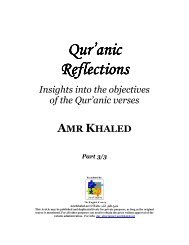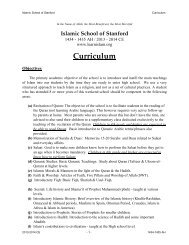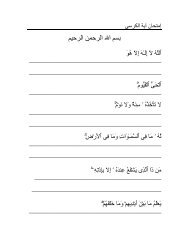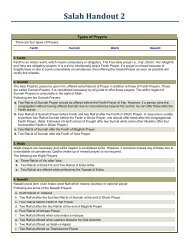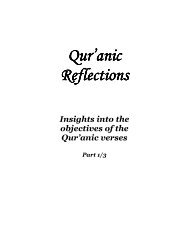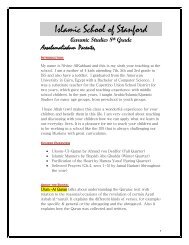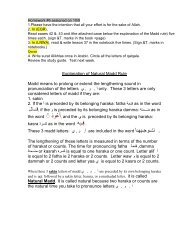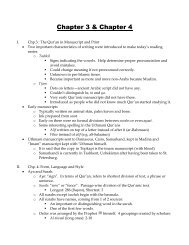Quranic Reflections - Islamic School of Stanford
Quranic Reflections - Islamic School of Stanford
Quranic Reflections - Islamic School of Stanford
You also want an ePaper? Increase the reach of your titles
YUMPU automatically turns print PDFs into web optimized ePapers that Google loves.
the land. Shall we then pay you a tribute in order that you might erect a barrier<br />
between us and them” (TMQ, 18:94).<br />
Despite the fact that he was capable <strong>of</strong> building the barrier alone, he asked for help so<br />
that they may learn a lesson from it. Allah (SWT) says what can be translated as, “So<br />
help me with strength (<strong>of</strong> men), I will erect between you and them a barrier…but<br />
no one knows its true meanings except Allah” (TMQ, 18:95). He built the barrier,<br />
which has remained standing until today. However, we do not know where the barrier<br />
actually is, and thus will not be able to know where Ya’juj and Ma’juj’s are located<br />
until their appearance before the Day <strong>of</strong> Judgment.<br />
The connection between the four stories<br />
We must remember that the Qur’an does not just narrate stories in quite a random<br />
manner; they rather form an integral structure and serve a specific meaning. For<br />
example, the story <strong>of</strong> Prophet Musa (AS) does not mention the Pharaoh or the miracle<br />
<strong>of</strong> the stick because the meaning intended in this case is different from that found in<br />
either <strong>of</strong> those stories. What is then the thread which ties the four aforementioned<br />
stories together<br />
The stories talk about the major trials and temptations in human life:<br />
1- The trial <strong>of</strong> religion: the case <strong>of</strong> people’s evil acts towards a believer in the<br />
form <strong>of</strong> harm, torture or threats which may cause his loss <strong>of</strong> faith, deviation<br />
from religion or fear. This was the trial the people <strong>of</strong> the cave experienced and<br />
passed.<br />
2- The trial <strong>of</strong> wealth: this was the trial <strong>of</strong> the man with the two gardens, who<br />
was so proud <strong>of</strong> his wealth that he considered the hereafter not to be true.<br />
Allah (SWT) says what can be translated as, “And I think not the Hour will<br />
ever come, and if indeed I am brought back to my Lord, (on the Day <strong>of</strong><br />
Resurrection), I surely shall find better than this when I return to<br />
Him…but no one knows its true meanings except Allah “ (TMQ, 18:36).<br />
3- The trial <strong>of</strong> knowledge: The case <strong>of</strong> a man who boasts <strong>of</strong> the knowledge he<br />
possesses to the extent that he feels arrogant and hence forgets about modesty.<br />
Such a man may learn things <strong>of</strong> no benefit to him or to his community. Or else<br />
he may misuse the knowledge he was granted in a way that may harm him or<br />
the society in which he lives. The trial <strong>of</strong> knowledge is illustrated in the story<br />
<strong>of</strong> Prophet Musa (AS) and Al-Khidr. Prophet Musa (AS) thought that no one<br />
on earth was more knowledgeable than him. However, once he realized that<br />
this was untrue, he traveled a long distance to meet the more knowing man<br />
and to learn from him in a truly respectful and modest relation <strong>of</strong> a pupil to his<br />
teacher. Allah (SWT) says what can be translated as, “Musa said to him<br />
(Khidr): “May I follow you so that you teach me something <strong>of</strong> that<br />
knowledge (guidance and true path) which you have been taught (by<br />
Allah) But no one knows its true meanings except Allah” (TMQ, 18:66).<br />
4- The trial <strong>of</strong> power: The example <strong>of</strong> a man who, given all the means to<br />
achieve material and technological success to push civilization forward and to


